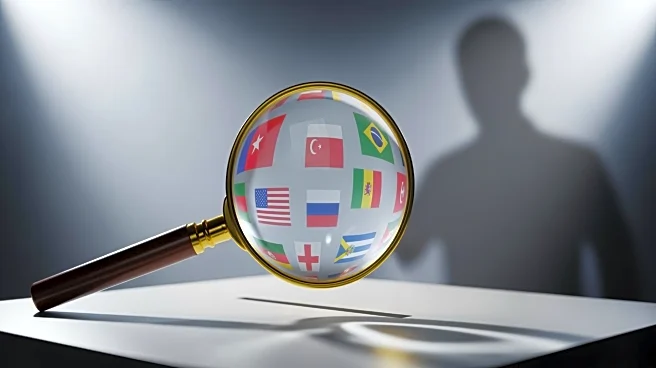What's Happening?
The U.S. Department of Justice is examining a campaign event involving New York Assembly member Zohran Mamdani and former U.K. Labour Party leader Jeremy Corbyn. Corbyn participated in a phone-banking
session to support Mamdani ahead of the New York City mayoral election. Harmeet Dhillon, a member of the Justice Department’s leadership team, raised concerns about the legality of Corbyn's involvement, citing U.S. election laws that prohibit foreign nationals from influencing American elections. The event was organized by the New York City chapter of the Democratic Socialists of America and promoted through the Action Network platform. The DOJ, Mamdani, and Corbyn have been contacted for comments.
Why It's Important?
This situation highlights the complexities of U.S. election laws regarding foreign involvement. While Corbyn's participation was voluntary, it raises questions about the boundaries between legal political speech and prohibited foreign influence. The case underscores the sensitivity of foreign nationals' involvement in U.S. elections, especially in light of past concerns about foreign interference. The DOJ's review could set precedents for how similar cases are handled in the future, impacting how campaigns engage with international figures and movements.
What's Next?
Currently, there is no formal investigation by the DOJ, but the matter could be reviewed to determine if any illegal contributions or coordination occurred. Legal experts suggest that Corbyn's unpaid volunteer work is likely permissible under federal law. However, the situation may prompt campaigns to reassess their engagement with foreign nationals to avoid potential legal issues. The outcome of this review could influence future campaign strategies and the interpretation of election laws regarding foreign participation.
Beyond the Headlines
The case reflects broader concerns about international solidarity movements and their influence on U.S. politics. It also highlights the legal gray areas in election laws, particularly regarding unpaid volunteer work by foreign nationals. The situation may lead to increased scrutiny of political movements with international ties and their compliance with U.S. laws, potentially affecting how these groups operate and collaborate across borders.










